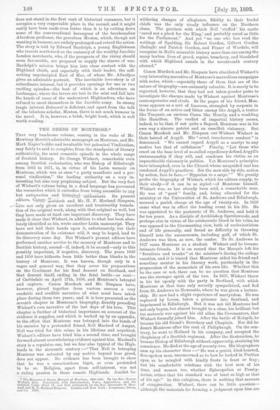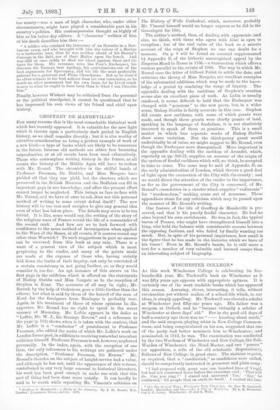THE DEEDS OF MONTROSE.* THIS very handsome volume, coming in
the wake of Mr.
Mowbray Morris's admirable monograph on Montrose, and Mr. Mark Napier's older and invaluable but polemical Vindication, may fairly be said to complete, from the standpoint of literary authenticity, the most romantic episode in the whole range of Scottish history. Dr. George Wishart, remarkable even among Scottish ecclesiastics, who was Bishop of Edinburgh from 1662 to 1671, is, in virtue of his Latin memoir on Montrose, which was at once "a party manifesto and a per- sonal vindication," the leading authority on a very in- teresting but also very perplexing subject. But the very fact of Wishart's volume being in a dead language has prevented the researches which it embodies from being accessible to any but antiquarian and histosinjz Its present editors, ClaiD-11uidoch and Mr. H. F. Mariana Simpson, .,e4litve not only given an excellent and trustworthy transla- tion of the original work, along with that original as well, but they have made at least one important discovery. They have made it clear that Wishart, in addition to what has been abso- lutely identified as his, wrote another Latin manuscript. They have not laid their hands upon it, unfortunately, but their demonstration of its existence will, it may be hoped, lead to its discovery some day. But Wishart's present editors have performed another service to the memory of Montrose and to Scottish history, second—if, indeed, it be second—only to this possibly important, if negative, discovery. The years 1649 and 1650 have hitherto been little better than blanks in the history of Montrose. It was known, though only in a vague and general way, that they cover his preparations on the Continent for his final descent on Scotland, and that descent itself, ending in the fatal battle—or rout— of Carbisdale on April 27th, 1650, and Montrose's betrayal and capture. Carton Murdoch and Mr. Simpson have, however, pieced together from various sources a very readable and credible narrative of what must have taken place during these two years; and it is here presented as the seventh chapter in Montrose's biography, directly preceding Wishart's own narrative of the last days of his hero. This chapter is further of historical importance on account of the evidence it supplies, and which is backed up by an appendix, to the effect that Montrose was betrayed into the hands of his enemies by a pretended friend, Neil Macleod of Assynt.
Neil was tried for this crime in his lifetime and acquitted.
Wishart's editors have tried him a second time, and brought forward almost overwhelming evidence against him, Macleod's story is a repulsive one, but we fear also typical of the High- lands in the sixteenth century :—" That Neil in betraying Montrose was actuated by any motive beyond base greed, does not appear. No evidence has been brought to show that he was a conscientious bigot, or even pretended to be so. Religion, apart from self-interest, was not a ruling passion in those remote Highlands. Amidst be- -- -- .0 The Memoirs of Imo.% Marquis of Morktroso, faso, By the Rev. George Wiehart, D.D. Translated, with Introdnotion, Notes, Appendices, and the Original Latin (Part II. now Bret published), by the Rev. Alexander D Mur- doch and H. T. Idorland Simpson. London rind New York Longmans, Green, And Co. 1893. wildering changes of allegiance, fidelity to their feudal chiefs was the only steady influence on the Northern clans. The garrison with which Neil ' staffed' his castle cared not a plea for the King,' and probably cared as little for the Parliament." And yet "no one who has read the writings of Spalding, Sir Robert Gordon, Gilbert Gordon (Sallagh) and Patrick Gordon, and Fraser of Wardale, will recognise in Neil's miserable history more than one among the many lawless lives of greed, rapine, treachery, and bloodshed with which Highland annals in the seventeenth century abound."
Canon Murdoch and Mr. Simpson have elucidated Wishart's very interesting narrative of Montrose's marvellous campaigns with notes, which—especially those of them that are of the nature of biography—are eminently valuable. It is surely to be regretted, however, that they bad not taken greater pains to investigate the charges made by Wishart against Montrose's contemporaries and rivals. In the pages of his friend, Mon- trose appears as a sort of Laocoon, strangled by serpents in the forms of an active and bitter enemy like Argyll, a traitor like Traquair, an envious Caeca like Huntly, and a weakling like Hamilton. The verdict of impartial history seems, indeed, to be that, if not quite a Bayard, Montrose was in his own way a sincere patriot and an unselfish visionary. But Canon Murdoch and Mr. Simpson out-Wishart Wishart in their hatred of Argyll. His "cruel, treacherous conduct" is denounced. " We cannot regard Argyll as a martyr to any motive but that of selfishness." Finally, "Let those who crawl on the base level of so-called expediency defend Argyll's statesmanship if they will, and condemn his victim as an impracticable visionary in politics. Yet Montrose's principles have triumphed, even in the Church whose misguided zeal has condoned Argyll's practices. Set the men side by side, action by action, face to face,—' Hyperion to a satyr.' " We greatly prefer the biography of Wishart, which his editors supply, to their study—if it can be so styled—of Montrose himself. Wishart was, as has already been said, a remarkable man. He was of " good " family, and, being educated for the ministry at the Universities of St. Andrews and Edinburgh, secured a parish charge at the age of twenty-six. In 1626 came what was in effect the leading event in his life. He was appointed to the pastorate of St. Andrews, and held it for ten years. As a disciple of Archbishop Spottiswoode, and perhaps also in virtue of the aristocratic blood in his veins, he was opposed to the Covenanting view, both of ecclesiasticism and of life generally, and found no difficulty in throwing himself into the amusements, including golf, of which St. Andrews was then, as now, the centre. To St. Andrews in 1627 came Montrose as a student. Wishart and he became intimate friends. It is on record that the Marquis left his "furniture and trunks" at the minister's during the college vacation, and it is hinted that Montrose aided his friend and sometime mentor in his literary work, particularly in the preparation of the memorials of his own life. Whether this be the case or not, there can be no question that Montrose was the stronger spirit of the two. In 1637, Wishart threw in his lot openly with the party in Scotland, with which Montrose at that time only secretly sympathised, and fled from St. Andrews to Newcastle, where he was given a lecture- ship. He now had a slight experience of martyrdom. He was captured by Leven, taken a prisoner into Scotland, and imprisoned in Edinburgh. But it was not till Montrose had not only begun, but almost brought to a close, his brilliant but too meteoric war against his old allies the Covenanters, that Wishart formally joined him. After the battle of Kelsyth, he became his old friend's Secretary and Chaplain. Nor did he desert Montrose after the rout of Philiphaugh. On the con- trary, he went to Holland in his company, and accepted the chaplaincy of a Scottish regiment. After the Restoration, he became Bishop of Edinburgh without, apparently, straining his conscience. He died at the age of seventy-two. His biographers sum up his character thus :—" He was a genial, kind-hearted, free-spoken man, unconcerned as to how he looked in Puritan eyes, as he mingled with kindly Scots in feast or fray; but his comfortable relations with the best men of his time, and women too, whether Episcopalian or Presby- terian, evince that his standard was at least as high as that of his age." In this eulogium, there is nothing that savours of exaggeration. Wishart, there can be little question— although the materials for forming a judgment upon him are too scanty—was a man of high character, who, under other circumstances, might have played a considerable part in his country's politics. His contemporaries thought as highly of him as his latter-day editors. A "character" written of him at his death describes him thus
A soldier who retained the innocence of an Hermits in a Bar- barous camp, and who brought with him the valour of a Martyr to a barbarous barr, thus he was neither afraid of his Enemy's Courage in the field, nor of their Malice upon the bench. And was still at once reddy to shed his blood against them and his tears for them. His revenues were the Poor's Exchequer, his discours his Enemys best Apology, his conversations one of the best arguments for Episcopacy, and his life the most preferable paean° for a generous and Pious Churchman. But as he desied no other witness to his best actions than his own conscience, so ho needs no other monument but his own fame, for he Lived mlleli nearer to what he ought to have been than to what 1 can Discribo him."
Finally, however Wish art may be criticised from the personal or the political standpoint, it cannot be questioned that he has impressed his own views of his friend and chief upon history.



































 Previous page
Previous page